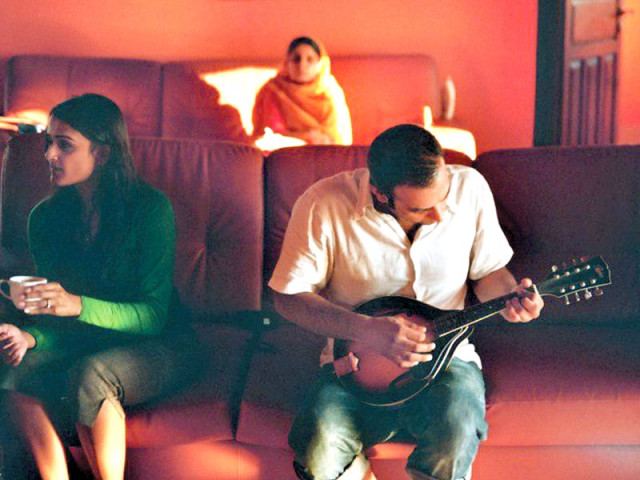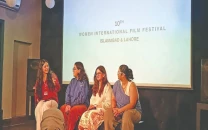Comment: Pakistan’s indie tunes
You don’t have to confine your creativity to the norms set by traditional media to be able to release...

Comment: Pakistan’s indie tunes
Many years ago, it was quite difficult for a musician to present his piece to the world. Oftentimes, one had to abide by the rules set by the industry. “Oh, you can’t do this, this will not appeal to the masses,” or “this is too gora for our market” were comments made frequently by those who were responsible for bringing the music to the masses.
Even then, some of the musicians had the courage to present what they really believed in, albeit facing a ban by the authorities. “Ehtesaab” by Junoon and “Behti Naar” by Rushk are just two examples. Songs and videos of both were banned from airing for very different reasons — one for talking about government accountability and the other for provocative imagery.
Thanks to YouTube (which is currently banned) and other internet and social media sources, it is fairly easy for one to share their musical rant with just about everybody. The musicians of today are doing just that, creating what many term as ‘the cool’ or Pakistan’s ‘indie music’ scene.
In a recent wave that has swept fans across Pakistan and abroad, a number of songs have made it into what can easily be termed as the offbeat or indie music genre. A series of these songs have established the fact that you don’t have to confine your creativity to the norms set by traditional media to be able to release your music and for it to be viewed by a large majority of people.
Socio-music on social media
Socio-political statements made by musicians are not a new phenomenon but releasing it exclusively via social media seems to be. “Waderai ka Beta” by comedian Ali Gul Pir is the ideal example of a humourous commentary on the feudal mindset that prevails in Pakistan. The song was released on YouTube and overnight became a success with the number of hits it received. Within three months of its release, it has accumulated over two million hits — an unprecedented response for any locally released song.
More recently, brother of famed actor and singer Meesha Shafi, Faris Shafi released “Awaam” on the same lines. With a sparse use of abusive language, this song talks about the problems of the common man in today’s Pakistan. Both these songs are true examples of social media hits since they have not been played on mainstream media.
Another band that is known for their offbeat sound, co-Ven led by Hamza Jafri is set to release a song called “Chor”. While the band is known for songs they have sung in English, “Chor” is a complete opposite. Sikander Mufti, a member of this band, and an independent musician himself, premiered the song at a private gathering of artists and friends. The release date for this song has not yet been given.
Off the beaten track
Apart from the social commentaries and songs with their hands on the pulse of the common man, there have been other releases which have stunned audiences for their offbeat and independent sound.
A few years ago it was Sajid and Zeeshan who permeated the northern part of our country with their genius music. Now it seems that the duo of Naseer and Shahab is going to continue this fascinating combination of Pukhtoon influences in pop music further. “Zar Sta Pashan Na Yam” is a Pushto language song that literally means “I am not like you”. This song has been doing the rounds on radio channels as well as gaining appeal on social media and YouTube.
Then there is the release of Omar Tajammal’s “Beautiful” which has an international feel. Omar’s song is in English like other releases such as co-Ven’s “Sailing Fast” and “Third World Celebrity”. Because of their exposure to the language, the new artists are more comfortable expressing themselves in English and employing a more ‘international’ sound as opposed to traditional South Asian music elements. An English language song may bring with it a more global acceptability but at the same time risks alienation by local listeners. Tajammal is aware of this, “I took this step knowing that it is unlikely to cater to the entire local audience simply because it is unfair to expect a nation which largely communicates in Urdu to want to listen to music in another language. I want my music to have universal elements like a catchy rhythm to engage everybody so no one is alienated. Music speaks a universal language, as long as the song is good, it is going to be heard.”
A number of new artists are fast creating a genre that relies on musical experiments and social elements; all of this cross pollination is creating a sound that is truly independent, contributing significantly to the new wave of Pakistani music.
The writer is a former print and broadcast journalist who has worked at The News and Geo TV.
Published in The Express Tribune, September 23rd, 2012.
Like Life & Style on Facebook and follow at @ETLifeandStyle for the latest in fashion, gossip, entertainment


















COMMENTS
Comments are moderated and generally will be posted if they are on-topic and not abusive.
For more information, please see our Comments FAQ